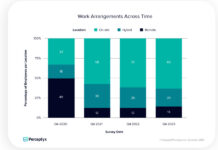
Will 2024 see less of an emphasis on employee experience, or will employers keep worrying about things like health and wellbeing? The answer depends on who you ask.
A variety of technology and workforce issues, from AI-related challenges to continued hand-wringing over the economy, is pressuring employers to invest less time and money on nurturing the employee and candidate experience. Forrester Research predicts that activity related to employee engagement and “culture energy” will both decline during 2024, continuing the downward movement seen during the previous two years.
But, others say, rising healthcare costs and general stress are forcing businesses to prioritize softer workforce issues. Just more than half of employers, 51%, regard employee satisfaction as their most important goal, according to the Integrated Benefits Institute. That’s followed by cost mitigation/revenue generation, at 41% — a 10-point difference.
Employers still pay notable attention to how their workers respond to health and related benefits, IBI said. Some 72% collect data on satisfaction and 57% on retention. Fifty-two percent link health and wellness to productivity.
The question is whether this level of attention will continue. Not only will employers invest less in employee experience, but Forrester Vice President and Principal Analyst J.P. Gownder expects the number of companies with a DEI function and strategy will drop in 2024, much as it did last year: Between 2022 and 2023, the number of such businesses dropped from 33% to 27%.
Demographics Change Perceptions
Behind changing employer priorities is the labor market’s changing dynamics, Gownder told HR Dive. Employers tend to put money into experience-related projects “when there’s a lot of attrition or things are going poorly on the employee front and they can’t keep talent,” he said. Today, employers “aren’t so desperate to keep people.”
At the same time, what’s valued by workers is changing along with demographics, IBI noted. Employees between 30 and 45 years old were most interested in work-life balance (28%), financial wellbeing assistance (19%) and health education (18%). Those over age 46 were most interested in preventative screenings and financial assistance. Workers under 30 were focused on balance and flexibility, along with fitness and wellness programs.
To address such changes, IBI says employers should reevaluate policies and programs to ensure they align with objectives around productivity, growth and efficiency. Also, they should offer training and support for managers and streamline point solutions, plan offerings and policies to reduce confusion.
Image: iStock















